#(This post is about physical disabilities
Explore tagged Tumblr posts
Text
I think it's both sad and hilarious to see the difference between how small children react to disabled people and how teenagers/adults react to discabled people.
Small children are just curious and want to understand why and how things work, so of course when I'm walking with my cane and limping and taking walking breaks, they're going to be confused. Sometimes their questions are blunt but it's obvious they're just curious and mean well.
And then there's everyone else. They don't even want to know about why you're disabled or anything, they just want proof that you are allowed to be disabled (like that's a fucking thing). And every time they say shit like "well prove it. Prove that you're disabled" I just look at them with a confused face. Who the fuck do you think you are, demanding to see my personal medical records, move the fuck out of the disabled parking space you abled piece of shit.
#I am just so mad today#Cripplepunk#This post is about physical disabilities#do not derail#crip punk#cripple punk#AMPS#amplified musculoskeletal pain syndrome#ouch#spoonie#chronically ill#cane user#chronic illness#soulless speaks#invisible illness
115 notes
·
View notes
Text
the funniest meltdown ive ever had was in college when i got so overstimulated that i could Not speak, including over text. one of my friends was trying to talk me through it but i was solely using emojis because they were easier than trying to come up with words so he started using primarily emojis as well just to make things feel balanced. this was not the Most effective strategy... until. he tried to ask me "you okay?" but the way he chose to do that was by sending "👉🏼👌🏼❓" and i was so shocked by suddenly being asked if i was dtf that i was like WHAT???? WHAT DID YOU JUST SAY TO ME?????????? and thus was verbal again
#yeehaw#1k#5k#10k#posts that got cursed. blasted. im making these tag updates after... 19 hours?#also i have been told it should say speech loss bc nonverbal specifically refers to the permanent state. did not know that!#unfortunately i fear it is so far past containment that even if i edited it now it would do very little. but noted for future reference#edit 2: nvm enough ppl have come to rb it from me directly that i changed the wording a bit. hopefully this makes sense#also. in case anyone is curious. though i doubt anyone who is commenting these things will check the original tags#1) my friend did not do this on purpose in any way. it was not intended to distract me or to hit on me. im a lesbian hes a gay man. cmon now#he felt very bad about it afterwards. i thought it was hilarious but it was very embarrassed and apologetic#2) “why didn't he use 🫵🏼?” didn't exist yet. “why didn't he use 🆗?” dunno! we'd been using a lot of hand emojis. 👌🏼 is an ok sign#like it makes sense. it was just a silly mixup. also No i did not invent 👉🏼👌🏼 as a gesture meaning sex. do you live under a rock#3) nonspeaking episodes are a recurring thing in my life and have been since i was born. this is not a quirky one-time thing#it is a pervasive issue that is very frustrating to both myself and the people i am trying to communicate with. in which trying to speak is#extremely distressing and causes very genuine anguish. this post is not me making light of it it's just a funny thing that happened once#it's no different than if i post about a funny thing that happened in conjunction w a physical disability. it's just me talking abt my life#i don't mind character tags tho. those can be entertaining. i don't know what any of you are talking about#Except the ppl who have said this is pego/ryu or wang/xian. those people i understand and respect#if you use it as a writing prompt that's fine but send it to me. i want to see it#aaaand i think that's it. everyday im tempted to turn off rbs on it. it hasn't even been a week
149K notes
·
View notes
Text
Anyway, people with brain damage I love you. People who have had strokes I love you, especially if you're told you were "too young" to have one. People who acquired your brain damage by less common means such as infection, lack of oxygen at birth or degenerative disease, I love you. People with moderate and severe brain damage, I love you. People who lost their sight or hearing or ability to speak because of their brain damage, I love you. People who have paralysis from their brain damage, I love you. People with amnesia and severe cognitive issues from their brain damage, I love you. People with rare and unusual symptoms from their brain damage, I love you.
You are not a punchline, you haven't lost your humanity, your thoughts and opinions are as valuable as anyone else's. We deserve respect.

[ID: a dark red banner with the words "This post is about physical disabilities, do not derail." in grey font. Either side of it is a lighter grey wheelchair user symbol with the user leaning forward with the arms raised and back, giving the appearance of wheeling fast. End ID.]
#actually disabled#neurological disability#traumatic brain injury#acquired brain injury#stroke survivor#neurological illness#cripplepunk#cripple punk#disability#physical disability#annoying that every post about brain damage needs that banner or it'll be swarmed with 'depression is brain damage actually 🥺' people#1k#2k#3k
5K notes
·
View notes
Text
You are well within your right to be angry about the help you didn't get and should have gotten.
You are well within your right to be angry about having your needs neglected.
You are well within your right to be angry.
#this post is mainly about physical disabilities and needs not being met#things like medical neglect or refusal of services for whatever reason#able bodied ppl with non-physical disabilities are allowed to like and reblog and relate and stuff too ofc!#But I made this post in part for myself#to reassure myself that it's ok that I never received help for my chronic pain as a child despite it being bad#cripple punk#cpunk#cripplepunk#physical disability#actually disabled#physically disabled#angry cripple
5K notes
·
View notes
Text
Shout out to people who use adult diapers
Shout out to people who have chronic UTI
Shout out to people who have catheters
Shout out to people who have urostomys
Shout out to people who still wet the bed
Shout out to people with kidney scarring
Shout out to people who deal with kidney stones
Shout out to people with kidney cancer
Shout out to people with kidney failure
Shout out to people who I didn’t mention but still have kidney/urinary tract issues
I love you, I know it sucks, the judgement sucks, the symptoms suck. You’re not gross, it’s okay to talk about it. Your suffering isn’t taboo, never let anyone treat you like it is.
#Nobody talks about us#poison is the posts#Poison is the cripplepunk#disability#disabled#physically disabled#cpunk#cripple punk#actually disabled#chronically ill#chronic illness#physical disability#disabilities
1K notes
·
View notes
Text
"Disabled people should be allowed to be as independent as we can be" and "disabled people should not be pressured to be hyper-independent in order to not wind up in nursing homes against our will" are two thoughts that can, and should, exist at the same time.
#physically disabled#cripplepunk#disability#original post#the number of people who assume I'm from an assisted living facility stuns me#I can do most things on my own#as far as I know I don't fall under 'high support' needs#yet I've had people ask about my caretaker and I'm like 'my what'#I have someone drive me and need help shopping#but that's about all
7K notes
·
View notes
Text
Geniuenly like. So many people claim support disability. But then say something completely untrue
Y’all support autism? So what about when the person has intellectual disability or need help walk talk eat bath use bathroom? Does your support end when you see someone with higher needs?? Someone who actually genuinely won’t survive without support from others n that support is sometimes having other people do everything for them.
Y’all support depression? What about when the person can’t bring themself to get out of bed for days on end? What about when that person goes days weeks months without cleaning self because can’t get up even though need to?
Yall support schizo-spec disorders & psychosis? What about what the person get violent because of their delusions n hallucinations? The ones know are fake but still can’t help but believe in? The ones genuinely believe in their delusions/ hallucinations? What about the ones don’t don’t get violent to self n other because of the disorder? Those that just sit scared about the hallucinations n delusions. The ones that won’t leave their room/ house out of fear of their delusions/ hallucinations?
Y’all support those with physical disabilities? What about the housebound bedbound ones? The ones need gait trainers walkers wheelchairs? What about the ones who full time users? Or the ones that need power chairs to independently move around? What about the ones crying screaming throwing up from their pain?
What about the disabled that always have a horrible attitude because tired of the disrespect? Tired of having to explain everything about them to everyone even if personal? Tired being told get over it n just educate others?
The disabled ones tired telling people not use certain terms. Tired of being spoken over n for without being thought about or asked. Tired of hearing their communication isn’t valid for ‘xyz’
Y’all support but act very picky about who deserves support and who’s not worthy of it. It’s not support if you pickin n choosing
#speech4amy#actually autistic#disabled poc#disability#autism#medium support needs#physical disability#mental disability#add on if want. know left out a lot but something#just couldn’t talk about because don’t actually experience but added as much as could#aac user#long post
2K notes
·
View notes
Text
being physically disabled as a young adult after being an physically active child in and physically active family, who still participates in the online spaces for physically active hobbies but cannot participate physically means… i’m a living nightmare. i talk to people who share this interest with me, and my existence is their worst nightmare. they see my crutches and hear that i cannot walk far or climb a ladder and think, thank god it isn’t me. my existence is horrible and unimaginable to able bodied people.
#i’ll never forget the guy who when i told him i was physically disabled and couldn’t walk much but could walk with aids#he said ‘oh that’s not that bad!’#he meant it genuinely and i understand where he’s coming from#but man#tell me you know nothing about disability without telling me you know nothing about disability#i just agreed and moved on but it stuck with me#cripple punk#cpunk#disabled#physically disabled#physical disability#spoonie#fibromyalgia#vent#this is a vent post#vent post#you can ignore this#this is about urbex but i don’t think it’s relevant so i won’t tag it#okay to reblog
532 notes
·
View notes
Text
Sometimes u just need to sob and scream and cry and bitch about ur disability
I think a lot of people feel like they need to be at completely at peace with their disability
And you don’t!
Be mad be sad be pissed off!
#disabled#disabled problems#disability#ehlers danlos syndrome#immunocompromised#rheumarthritis#chronic illness#autoimmine disease#angry cripple#this post is about physically disabled people#autoimmune#rheumatoid arthritis#cripple punk
4K notes
·
View notes
Text
It's okay if you've pushed yourself too far. It's okay if you overdid it and are dealing with the consequences. It's okay if you did something that made your condition worse, intentionally or unintentionally. You have autonomy & do not have to only do things that make you "better".
#reminder to self#cripple punk#disability#physically disabled#(This post is about physical disabilities#but nondisableds can interact)
1K notes
·
View notes
Text
I hate the look on able-bodied people's faces when you can't do a thing that you could do the day before. The look of disappointment, confusion, the "Oh but you could do it before. Are you SURE you can't do it?" Like yes, Brenda, I'm sure that I am in too much pain to function/move from my bed right now so going for a walk when I could move 50 feet yesterday without my cane IS too much.
#angry cripple#crip punk#cripple punk#cripple posting#disabilities#invisible disability#physically disabled#disabled#physical disabilities#this is about physical disabilities please don't derail this post#ehlers danlos type 3#ehlers danlos#ehlers danlos problems#ehlers danlos zebra#ehlers danlos syndrome#hypermobile ehlers danlos#fuck you eds#eds zebra#living with pots#fuck you pots#potsie#pots#fibro#fibromyalgia#fibro problems#fibropain#chronic illness#chronic pain#chronically ill#ableism
936 notes
·
View notes
Text
Sometimes being disabled means you can't go to college, can't get a job, have to live with your parents and that's ok. For a lot of us it means not being able to go outside most days, not being able to get up or move at all. It can mean needing someone to wash us or feed us or help us with the bathroom and that is ok. It doesn't mean that we're less than or that we aren't worth anything.
And it's valid for us to be mad about it. Even if we can overcome some of these things with accomodations we're allowed to be mad that we're in this situation, and wish that we weren't disabled because I sure as hell hate this shit.
#cripple punk#angry cripple#Soulless Speaks#Cpunk#actually disabled#disabled#cripplepunk#I don't know how to tag sorry#bed bound#house bound#medium support needs#high support needs#this is mainly about physical disability so please don't derail#Cripple posting#chronic pain#disability
1K notes
·
View notes
Text
sorry you think physically disabled people setting boundaries on their posts is annoying but y'all lost your privileges long ago
There is a long history of neurodivergent people talking over physically disabled people on this site and irl. That is why we get upset when we make a post sharing our experience and suddenly 90% of the comments/discussion are neurodivergent people talking about themselves. It's not cause we don't like hearing about other people's experiences, but y'all gotta listen to us sometimes. I'd rather that you'd all just continue to ignore us than actively talk over our community.
#wrenfea.exe#chronic disability#chronic pain#disability#cpunk#cripple punk#cripplepunk#spoonie#physically disabled#chronic illness#saw a post complaining about people telling others to stop derailing their posts#and immediately knew what it was about
653 notes
·
View notes
Text
What's K.O. CRISIS?
Hey all. Over the past couple months, I've gotten a lot of followers who probably don't know about my OCs and portfolio projects that I'm also working on, so I'm making a quick master-post for it!
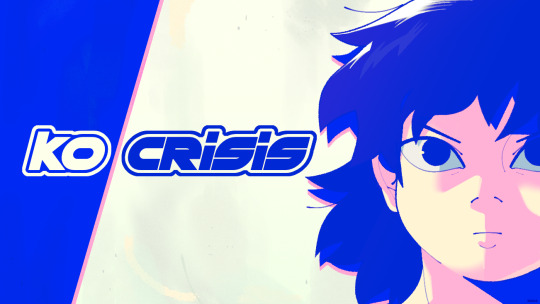
K.O. CRISIS is a series of artwork––character designs, illustrations, sketches, and animations––inspired by late-90s/early-2000s anime and Y2K culture.
Set in an alternate-history Los Angeles in the year 2001, the story follows disabled Taiwanese-American Ashley Tang as she fights her way to the top of the bracket in the national augmented boxing championship.

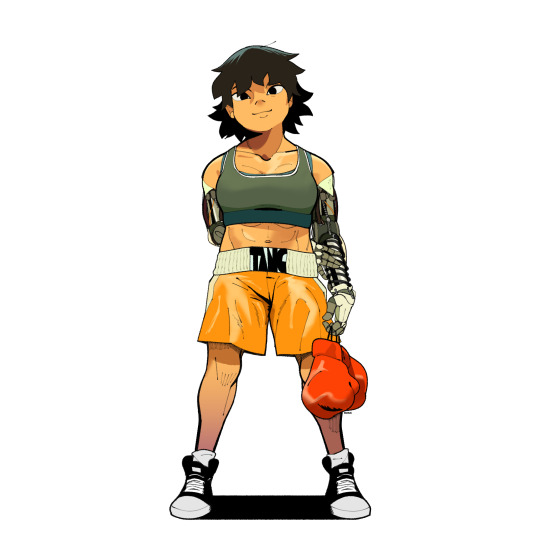
As the youngest female fighter in the championship, she'll have to fight tooth-and-nail to defend her place amongst the heavy-weights. While her rare dual arm prosthetics help even the playing fields, it'll take more than brute strength to prove her worth.
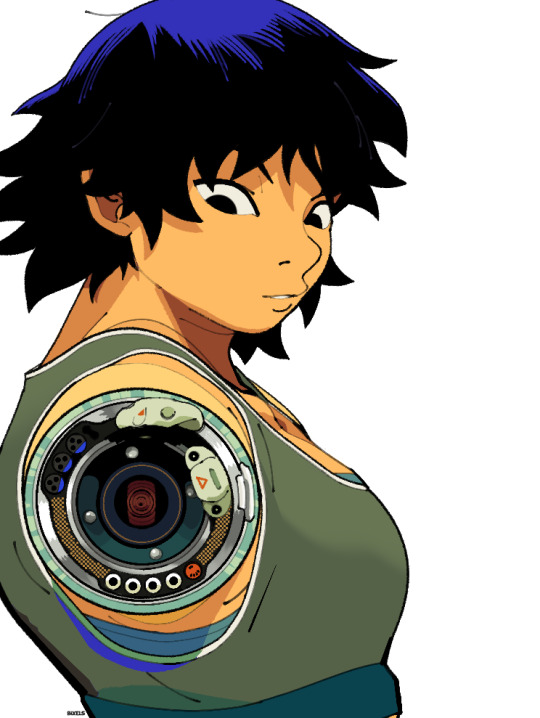
But this isn't a story about an underdog triumphing against all odds. Throughout the story, Ashley will push herself to the limit for the sake of validating her existence under the grinding heel of the sports media machine, in a world that values disabled bodies more than their lives. As the championship rages on, one question seems to linger through the roar: Is Ash strong enough to win, or is she brave enough to quit?
Through the project, I'm hoping to explore representations of prosthetic-users in pop culture as "enhanced superheroes," as well as discussions of trans-humanism under medical capitalism, the fetishization of new technology, and the commodification of disabled people as entertainment.
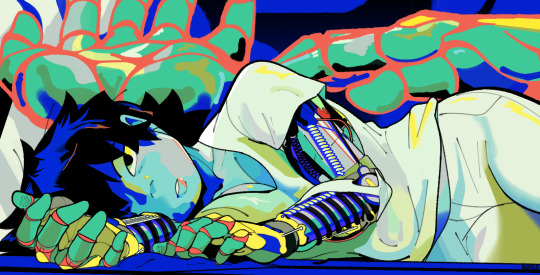
Accompanying her journey include characters like Noora Balakrishnan, a local transfem prosthetics engineer who doubles as Ashley's ringside mechanical cutwoman.
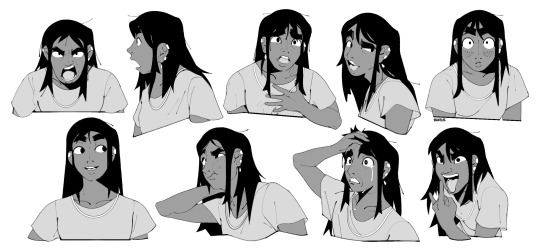
The project is still in its early stages, especially since I sorta rebooted it earlier this year (meaning I'm no longer using past, outdated art for the project). If you enjoy it, you can find more artwork for the project under the #ko crisis tag!
#long post#not art#ramblings#ko crisis#i'm not physically disabled myself so i implore anyone who is to share their thoughts and feedback if they feel so inclined.#if you feel that i show know something/if anything in this project makes you uncomfortable my dms are open#it's funny how half my followers are following me for historical 1920s cottage core art#when my main thing is sci-fi cyberpunk shit#also fun how this project's a live timeline of my art improvement#i was about to use noora's portrait when i went “wait... why are her shoulders so small. thats not right”#thats improvement babey
2K notes
·
View notes
Text
Why the fuck is it so hard for able bodied people to get their heads around the fact that specifically physically disabled people are not actually accommodated most of the time?
Whether it be the inaccessibility of a building due to stairs, heavy non auto doors, ramps that are too steep, broken elevators or just non existent elevators, etc the list goes on and on. Or now public spaces that let’s say are otherwise perfectly accessible are now inaccessible to so many people because so many people refuse to wear a fucking mask when it would cause then no harm (maybe just a bit of sweat) to wear one.
The fact that abled people don’t see just how fucked up and inaccessible the world is blows my fucking mind. Just because someone “can” do something or go somewhere doesn’t mean they should have to do that or that it’s safe for them to do so. Like sure I can do stairs but holy shit by the time I’m at the top I’m in so much pain and I feel like I’m gonna pass the fuck out man.
Bottom line, the world is really fucking inaccessible and that needs to be fixed. Physically disabled people’s voices need to be listened to and not talked over by ableds who think they know what’s best for us or who think the world is perfect as it is
#disabled#disability#actually disabled#chronic pain#chronic illness#physical disability#hypermobility#pots#pots syndrome#accessibility#accessibility problems#inaccessibility#inaccessible#listen to disabled people for gods sake#this post is about physical disability#yes spaces that may be technically accessible to disabled people might not be accessible for others with other disabilities#but that’s not what this shits about
2K notes
·
View notes
Text
DO YOU WANNA HELP YOUR DISABLED NEIGHBORS?
Rake up the wet leaves before we eat shit on the sidewalk! Your city or town should be doing it, but why would they??
#i get that ableds wouldnt think about it#but it would be nice to be thought about#walking or traveling safely should be a right#not a privilege for people with working legs#my cane has no grip#and im terrified#tw caps#cripple punk#cripplepunk#cripple#cripple shit#cripple problems#angry cripple#cripple life#cripple posting#cpunk#c punk#cpunk blog#c punk blog#mobility aid#mobility aid user#cane user#crutch user#wheelchair user#disability#disabled#physically disabled
200 notes
·
View notes